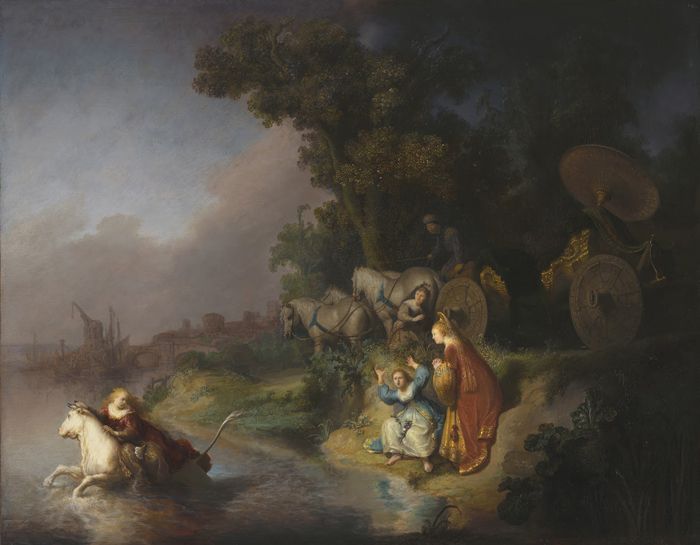The New Abduction of Europe:
Debt, War, Democratic Revolutions
Salt Beyoğlu
February 28, 2014 19.30 – 22.30

Digital image courtesy Getty’s Open Content Program, The J. Paul Getty Museum
What are the foundations for a new European cultural and political agency in a period of crisis?
L’Internationale conference, live stream from Museo Reina Sofía
The program will be held in English.
L’Internationale conference, live stream from Museo Reina Sofía
The program will be held in English.
PROGRAM
19.15
Vasıf Kortun: Introduction on the L’Internationale confederation and the New Abduction of Europe
LIVE STREAM FROM REINA SOFIA:
19.30 - 22.30
Part 1: Organizing in times of institutional crisis. Dialogue between Antonio Negri, Valery Alzaga and Ada Colau. Moderated by Raúl Sánchez Cedillo
Austerity policies put in place by European governments have turned a financial crisis into a project bent on the destruction of social and workers’ rights to establish a regime of infinite debt on individuals and institutions. At the same time, new political and institutional creations are demonstrating that debt and democracy based on citizen participation and on social rights are incompatible. Through these formations we can gain a glimpse of a Europe built from the bottom up, via the sense of brotherhood achieved by social struggles and the self-organization of citizens.
Part 2: New democracies and forms of the commons. Dialogue between Isabell Lorey, Montserrat Galcerán and Marina Garcés. Moderated by Raúl Sánchez Cedillo
The ideal of social and political citizenship in Europe has never been more than a distant aspiration, constantly belied by the facts. While in effect, it was dominated by a white, male, industrial, national and state-oriented figure. And with the hegemony of the neoliberal paradigm, even the collective reference associated with the working class and union movements has disappeared. The “government of the precarious” is imbued with individualism and the abandonment of collective solidarities. However, the practices of the commons, both those linked to the “natural commons” (water, land, renewable energies) and those linked to the “artificial commons” (knowledge, care-giving, networks) enable us to imagine a Europe united by new institutions of the commons, born out of cooperation and care-giving between precarious lives that have taken the form of a challenge.
Valery Alzaga. Chicana union organizer and migrant rights activist. She has also worked as a union co-ordinator in Europe and Africa. She is researching the development of new forms of bio-unionism and emotional organization.
Ada Colau. Activist and spokesperson of PAH (Platform for Mortgage Victims). She has been involved in numerous social movements since 2001. She is the co-author, along with Adriá Alemany, of the book Vidas hipotecadas. De la burbuja inmobiliaria al derecho a la vivienda (2012).
Montserrat Galcerán. Professor of philosophy at Universidad Complutense de Madrid. Social activist and writer, she is the author of Innovación tecnológica y sociedad de masas (1997) and Deseo (y) libertad. Presupuestos de la acción colectiva (2009).
Marina Garcés. Professor of philosophy at the University of Zaragoza and consultant at Universitat Oberta de Catalunya. Since 2002 she has been promoting and coordinating the collective project Espai en Blanc, which works towards an engaged, practical and experimental relationship with philosophical thought. She is the author of Un mundo común (2013) and En las prisiones de lo posible (2012) and she has also contributed to many journals and collective publications.
Isabell Lorey. Visiting professor of political theory at the Centre for Gender Studies at the University of Basel. She conducts research about the precarization of work and life in neoliberal society, social movements, democracy and representation. She is part of the collective kpD -kleines postfordistisches Drama- and she has published, among other works, Governmentality and self-precarization (2006) and Occupy! Die aktuellen Kämpfe um die Besetzung des Politischen (2012).
Antonio Negri. Post-marxist philosopher and thinker, co-author, with Michael Hardt, of Empire (2002), Multitude: War and Democracy in the Age of Empire (2004) and Commonwealth (2011) and Declaration (2013).
Raúl Sánchez Cedillo. Translator and editor of books by authors such as Toni Negri and Felix Guattari. Since the 1990s he has been involved in various political networks and research groups in post-operaist circles. He is part of Universidad Nómada and of the Fundación de los Comunes.
More info at: Museo Reina Sofía and nuevoraptodeeuropa.net

